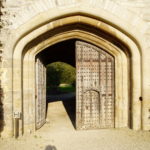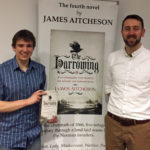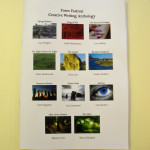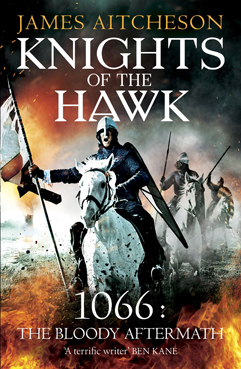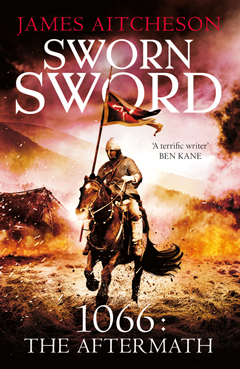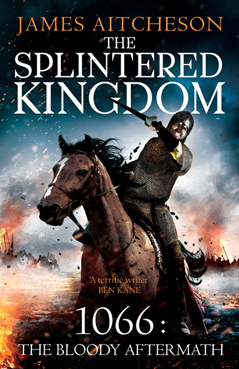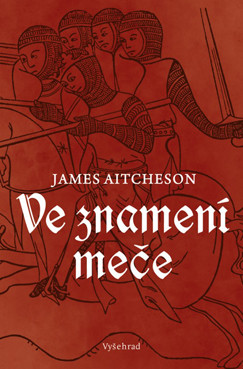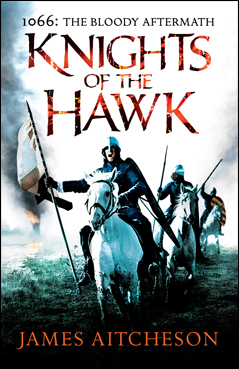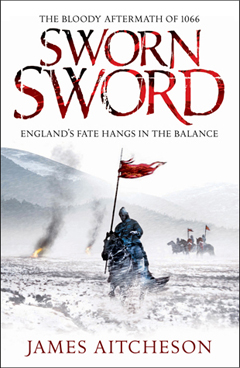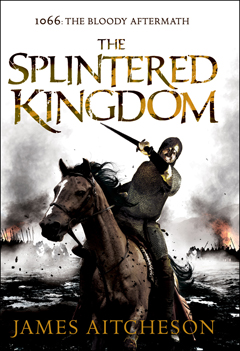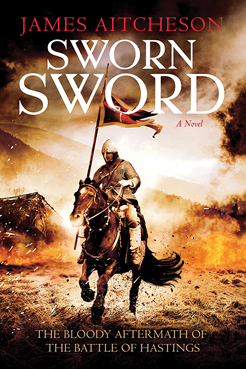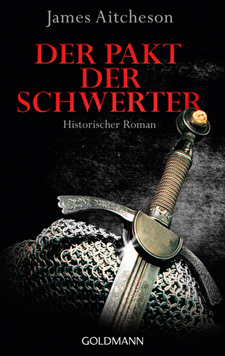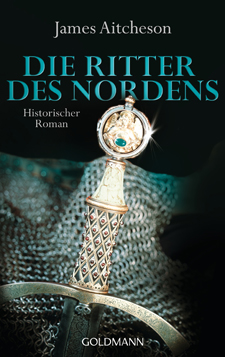This summer, after writing professionally for eight years, I finally penned my very first short story.
To some readers of this blog this may come as a surprise. Creative writing guides often advise those getting started to begin with short fiction: it is regarded by many as part and parcel of the traditional apprenticeship that writers must undergo. The short story, according to the theory, is the training ground where we’re supposed to hone our craft, to find our voice, to tighten our prose, to learn the skills that will allow us to tackle our bigger projects.
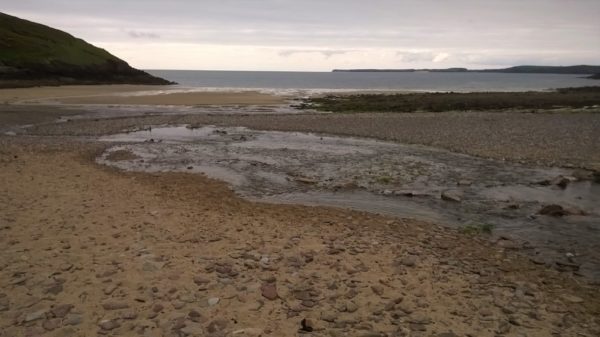
The beach at Manorbier, Pembrokeshire, pictured here on a grey and chilly April day in 2017, offered the inspiration for one of my short stories this summer.
There’s a certain logic to this school of thought. A novel is a mountain: to scale it takes considerable planning and preparation followed by a long and arduous climb to the summit, punctuated by unforeseen obstacles that aren’t always visible from base camp. And the metaphorical descent can be just as tricky, as you return over ground already covered: editing, reassessing and rewriting, often repeatedly. The prospect is daunting, and there are any number of reasons to give up along the way. The gratification that comes with completion can seem forever out of reach; it’s easy to misinterpret the constant struggle as a sign of failure.
The short story, on the other hand, offers a quicker route to that sense of gratification. For the novice, the knowledge of having completed something is invaluable: it is validation of one’s own ability. Success breeds confidence, and confidence breeds success. It’s a virtuous circle, or at least that’s the principle. It enables experimentation without risk.
But writing short fiction has its own unique challenges. Few of us read it, and even those of us who do tend not to consume it in the same quantity that we consume novels. If we don’t read it, how can we expect to be able to write it? When in 2006 I started out on my writer’s journey I certainly hadn’t read enough short stories to understand their form and structure. I did attempt to write a few, but without a clear idea of what I was trying to achieve, and so I soon abandoned them. What I wanted was to write a novel, and so with the single-mindedness of youth I set out from the beginning to do exactly that.
It’s only now – after an MA in Creative Writing, four published novels and now the first year of a PhD – that I feel I understand my craft well enough that I’m able to graduate from the novel to the shorter form. The short story is more technical, more succinct; it requires greater precision of language and phrasing. Every word matters. What is not said can be just as important as that which is made explicit. Working out how best to exploit the negative space around the words can reap immense rewards, but takes time.
A short story doesn’t obey the same conventions as its longer counterpart. It can be a puzzle for the reader to crack; it can pose questions without the pressure of having to offer resolution. In its very brevity it offers complexity. The process of writing one is certainly shorter, but not necessarily any easier than writing a novel. It requires skills that my younger self twelve years ago simply did not possess.
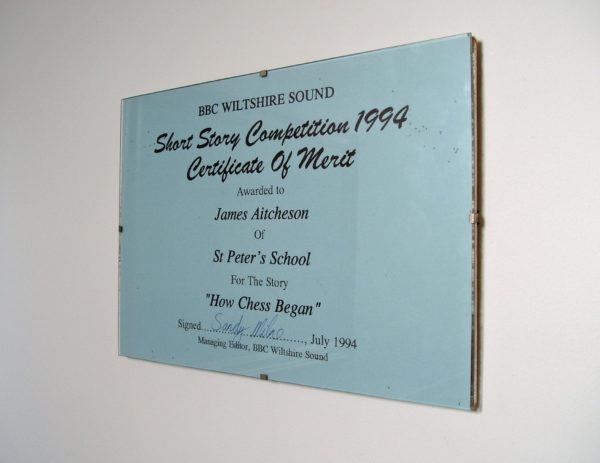
Disclaimer: in saying that I haven’t written a short story before, I’m obviously not counting the one I wrote when I was eight, which won me this lovely certificate from BBC Wiltshire Sound.
For me, writing short stories this summer has offered me a chance to experiment with voice, form and prose technique, to break away from my usual habits and comfort zones, and to test ideas for my bigger project – the novel that forms the heart of my PhD thesis. It has been liberating, allowing me to expand my horizons beyond historical fiction and try out other genres for the first time in years. (Not that I’ve ever seen myself purely as a historical novelist: that’s simply where my career has happened to take me so far.)
These past few months have been some of the most creative I’ve experienced, and the stories I’ve produced are, I believe, some of my most challenging and imaginative work. As I turn now back towards thinking about the novel, I feel reinvigorated but also increasingly aware of the possibilities of the longer form – and increasingly confident in my own ability to achieve them. More than ever I feel I’m on the cusp of something very exciting: I’m redefining myself as an author.
Get ready for James Aitcheson 2.0.
This week I wrote.
That probably seems like a fairly unremarkable thing for a novelist to say. But in fact this was the first time since last summer that I’d produced any substantial creative work at all.
Sure, I’d scribbled down musings from time to time: a phrase; a sentence; sometimes as much as two sentences in a row. I’ve put together a quick-fire story in ten minutes as part of an exercise during a writing workshop that I led recently.
What I hadn’t done in over six months was spend a full day at my computer engaged with my current novel. In fact, for most of 2017, I deliberately didn’t write, or did so only intermittently. My total word count for my work-in-progress amounted to not much more than 10,000 words – that is to say, roughly around 30 pages.
I was a writer who wasn’t writing.

Detail from the ceiling of St David’s Cathedral, St Davids (Pembrokeshire). Photograph taken during the writer’s retreat I went on in spring 2017.
Of course, there have been a few mitigating circumstances. I was busy with other things: firstly preparing to begin my PhD at the University of Nottingham, and then, from the autumn onwards, launching myself into my research, which has taken me down some fascinating avenues. (Look out for more posts about my research coming soon.) But the main reason for this extended break was simply that I needed the time to recharge my creative batteries.
By that point I’d been writing consistently for over a decade: I began working on my first novel, Sworn Sword, shortly after I graduated from Cambridge in 2006. Traditionally I’ve tried not to take very long between finishing one novel and starting the next – often no more than a couple of months. It always seemed like the best way of overcoming the fear of the blank page, and gave me a continuing sense of purpose.
What it’s meant, though, is that there’s rarely been a moment when I’ve not had one project or another actively underway. In ten years, I hadn’t allowed myself the chance to step back and think more broadly about my creative direction and what I’m looking to achieve.
Hence why I decided for once not to pitch myself into this latest novel with the same single-mindedness, but instead to let it evolve gradually. In fact, the most important imaginative work I did in 2017 was away from the computer, as I refocused my energies.
I ventured out into the field to explore the history embedded within the urban and the rural landscapes: castles, cathedrals, abbeys, churches, palaces, you name it. I invested in a replacement for my aging 2003-spec digital camera and experimented with photographing these sites, searching for new ways of looking at them and the world in general.
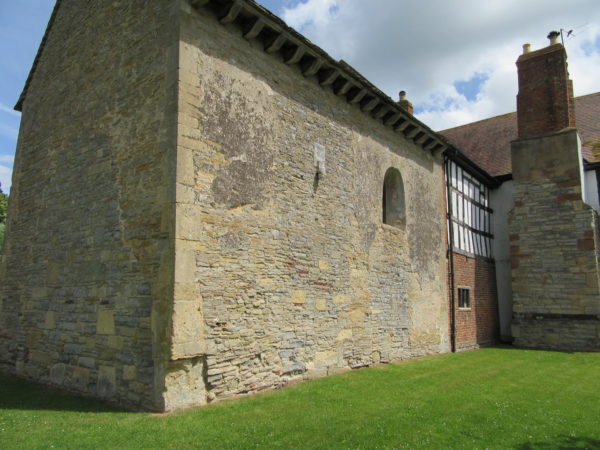
Odda’s Chapel, Deerhurst (Gloucestershire): a rare example of a surviving late Anglo-Saxon church, and the destination of one of my many historical field trips in 2017.
Armed with notepad and HB pencil, I sought out the ancient and medieval collections in museums across the country, and made rough sketches of the artefacts I saw: whatever inspired me, however magnificent or mundane.
I thought about writing, even though I was doing very little of it. I went on a retreat, and even though it wasn’t as productive as I hoped, I came back re-energised. I spent more time than usual in the company of other writers, talking with them about the challenges, joys and frustrations of the creative process, and revelled in that sense of community. (Writers, in my experience, tend to be solitary creatures by necessity rather than by nature.)
I read books by authors I’d never encountered before, in all sorts of genres: historical fiction; memoir; SF and fantasy; young adult; contemporary; short stories; magical realism. All the while I continued to make reams of notes for my work-in-progress – gems of insight that I could add to my treasure hoard.
When I finally came back to the novel this week, having not looked at it – or those extensive notes – for several months, I saw it at once in a new light. To put things into perspective: those 10,000 words from last year were already, in my view, a cut above anything I’d ever produced before. In purely numerical terms it might not have amounted to much, but technically and conceptually, I felt I’d made an enormous stride forward.
Once I set to work, though, I was quickly aware of how often the 2018-me was bringing out the red pen for paragraphs that the 2017-me had considered brilliant. Even though I hadn’t been actively exercising my writing muscles, my expectations had evolved. I had raised the bar; I’d become more demanding of myself, not to mention more confident in my own abilities.
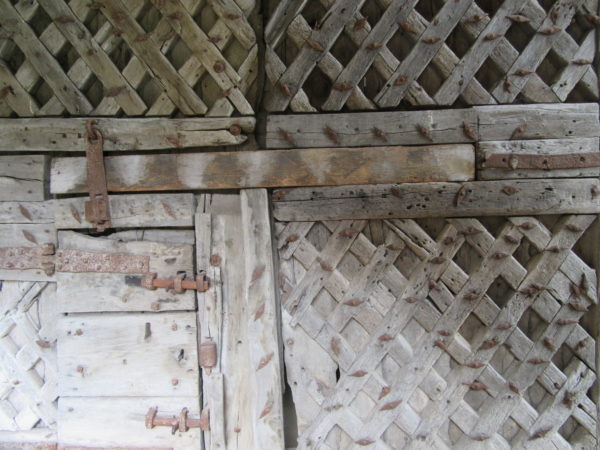
Detail of the oldest castle doors in Europe, at Chepstow Castle (Monmouthshire). Photograph taken during another of my many historical field trips in 2017.
The revised draft that eventually emerged was a considerable improvement in almost every aspect: better control of voice; greater precision of imagery; a more tightly worked approach to dialogue. And this made me think.
Is it possible to become a better writer by not writing?
From the very beginnings of our literary careers, we authors put pressure on ourselves to keep busy. How-to guides on getting started in creative writing often stress the importance of establishing a routine: making it a familiar habit. Indeed, the most common piece of advice I give to aspiring writers is simply to practise, and then to practise some more. There’s no great secret to it: the more you write, the better you’ll get.
For professional novelists, too, it’s easy to feel that if you’re not actively working on something, you’re not being productive. Readers, editors, booksellers and fellow authors are all eager to know not just about the current project, but also what’s next in the pipeline. (Will there be a sequel?) And, of course, time is money: if you’re not writing, you’re not earning.
At some point, though, it’s worthwhile taking a step back. If you’re to take your craft to the next level and produce something truly original, it makes sense to pause once in a while. Only by gaining some distance from the nitty-gritty can you see the bigger picture.
Don’t be a slave to your manuscript! Give your writing the room it needs to breathe. Take stock of what you’ve achieved so far. Think about how you might do things differently next time round. Consider new approaches, new ways of challenging yourself.
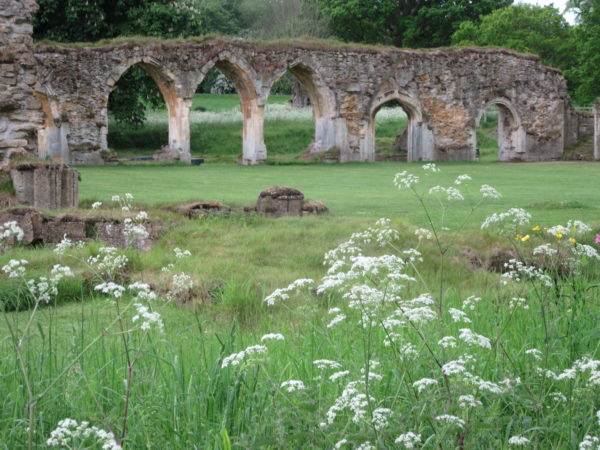
Hailes Abbey (Gloucestershire): a Cistercian monastery founded in the mid-13th century by Richard, Earl of Cornwall and younger brother of Henry III.
Reflect. Refresh. Get out for a bit. See the world. Read more books. Try your hand at another creative discipline. Open yourself up to new experiences. Do anything but write, at least for a little while.
Most importantly, by stepping back you allow yourself to recapture the passion, energy and ambition that made you want to write in the first place.
You owe that to yourself. And, in the long run, it’ll be worth it.
As many of you who follow me on Twitter and Facebook will already know, later this month I’ll be beginning a brand new chapter in my literary career. In just a few weeks I’ll be starting my PhD in Creative Writing at the University of Nottingham, thanks to an AHRC-funded studentship from the Midlands3Cities DTP.

The PhD will see me explore the boundaries of historical fiction and magic realism. I’ll be looking at medieval concepts of the otherworldly and supernatural in sources ranging from Beowulf to the Icelandic sagas, and using my findings to inspire and inform a novel set in medieval England that incorporates fantastical themes. It’s something of a departure in style and subject matter from my recent work, and I’m looking forward to delving into some of the weirder and more wonderful aspects of life in the Middle Ages.
Lately I’ve found myself thinking back to the autumn of 2007, just as I was embarking on a similar adventure with the MA in Creative Writing at Bath Spa University, where I began to develop the manuscript that eventually became Sworn Sword. I’d been writing in my spare time for several years, but I’d never before taken a formal course in the subject. Like everyone else, I was hoping it would be my first step on the journey towards seeing my name in print, but at that point publication, if I’m entirely honest, was still a distant dream.
Instead what most excited me about the MA was knowing that I had a whole 12 months ahead of me to develop my writing in a nurturing environment where experimentation was actively encouraged. The sheer energy of our cohort was infectious; it didn’t matter that were each working on wildly different projects, across every conceivable genre and in all manner of prose styles. We all knew the same joys of fiction-writing, and we all had the same goals: to learn and to improve.
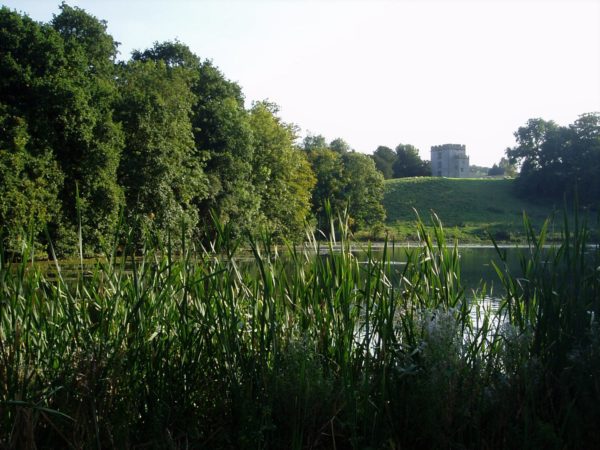
Bath Spa University’s picturesque Newton Park campus. In the distance is the castle, where I enjoyed many a creative writing workshop during the MA.
Now, as I prepare for this next stage in my literary career, I find that same excitement returning, in a strange reflection of that autumn ten years ago. That’s not to say, of course, that I haven’t enjoyed the process of writing four novels in the meantime: each one has been an exciting, sometimes terrifying, frequently frustrating, but always hugely rewarding adventure. But that raw passion and energy for the creative process – the thrill that comes from venturing into the unknown, exploring new horizons and discovering as-yet-untapped potential, without the burden of expectation – is something I’ve not experienced since I was a novice writer. It bodes well, I think, that I’m rediscovering those feelings now.
I’ve often said that it would have taken me ten years to learn on my own what I learned in a single year on the MA. The course transformed my prose and I emerged from it armed with the skills I needed to turn my ideas into a fully fledged novel, having opened up avenues that I’d never previously considered. Partly that was due to the support I received from tutors; partly it was the result of the considered and constructive feedback from my peers; partly it was down to self-reflection and intensive drafting, redrafting and studying.
As well as the strides I made creatively, I also made friendships to last a lifetime. I still meet regularly with many of the other writers I met on the course, to review each other’s work over coffee and cake: this has been without a doubt the most valuable legacy of the MA. I had no idea when I started just how big an influence it would prove to have on my life, and it makes me wonder what lies in store for me over the next three years…
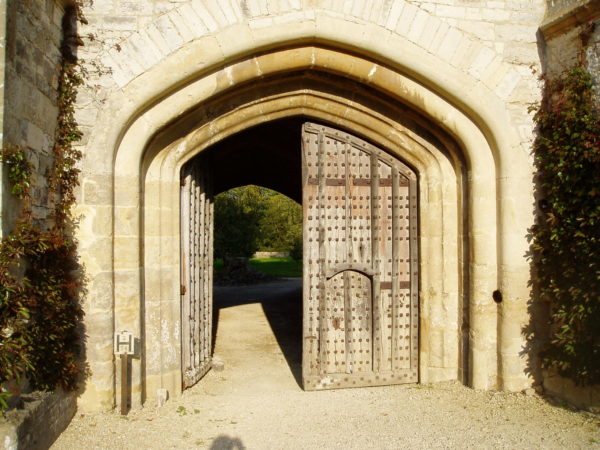
Another door opens… the gatehouse at Newton Park, Bath Spa University.
I’ve no doubt that the PhD will be a different beast: more self-directed, more research-focussed, it will require me to use different skills, and to develop some new ones along the way. But if I can recapture and hold on to that spirit of ’07, I hope to be able to match the progress I made that year, and even surpass it. To infinity – and beyond!
As well as visiting bookshops and libraries as part of my book tour, occasionally I’m also invited to speak about my work in universities and schools, and it’s been my pleasure in the last few weeks to present talks and chair workshops at both Swansea University and Huddersfield New College.
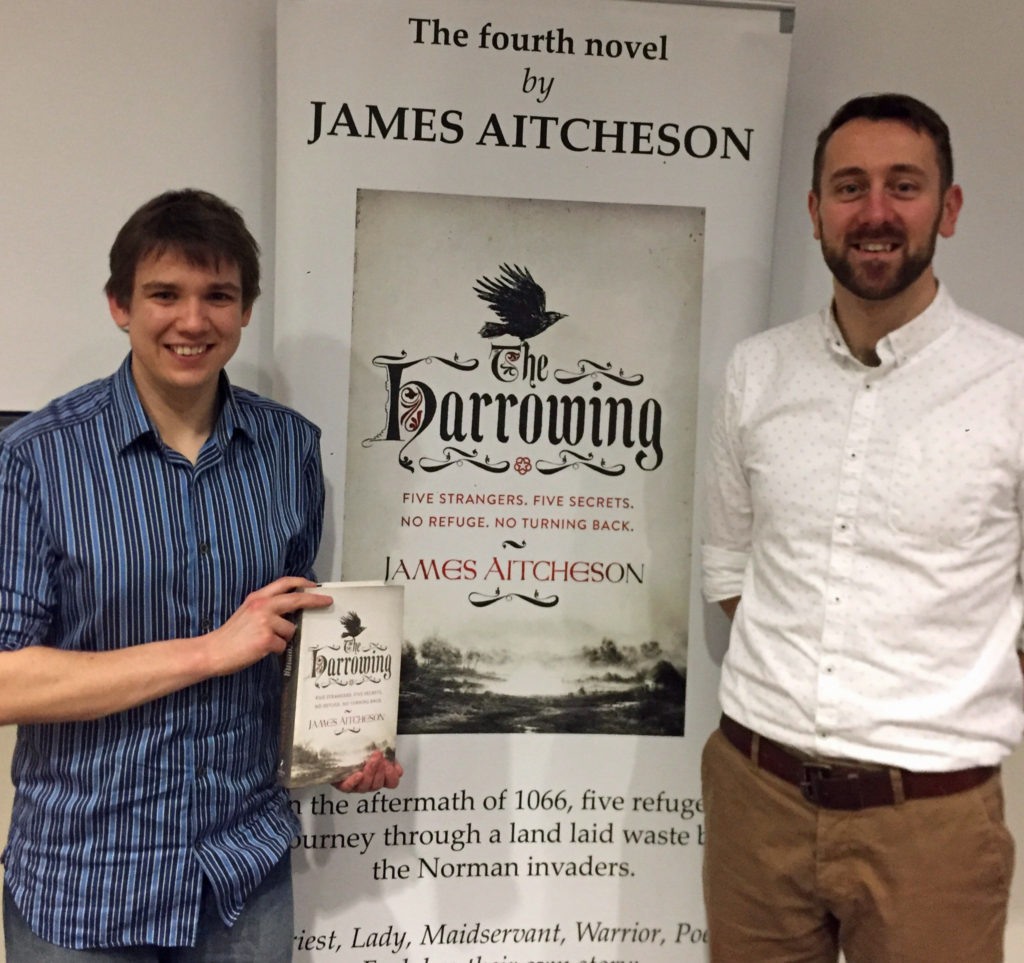
From left to right: myself and Dr Charlie Rozier following my public lecture at Swansea University. Photo credit: Swansea University.
At Swansea I was invited first to co-chair a workshop for medieval history students, looking at primary sources, their value and their limitations. After a short presentation by me, students used extracts relating to the Norman Conquest as inspiration for creative writing – an unusual and in many ways counterintuitive brief to give historians, for whom imaginative interpretation of available evidence doesn’t always come naturally, but an exercise that produced some interesting results.
Later I also gave a public lecture on the process of writing historical fiction, tackling a common question posed by readers, and one that has dominated the debate about the genre for seemingly forever: “Where do you draw the line between fact and fiction?” Drawing upon examples from my own work, I argued that we shouldn’t fixate, as we traditionally have done, on the issue of historical accuracy. Rather, we should celebrate fiction’s potential to understand, interpret and communicate the past in new ways, and I offered some alternative ways of framing the debate regarding the genre.
Both sessions provoked some lively discussion with staff and students, historians and writers alike. I was thrilled to be invited to speak – my thanks to Dr Charlie Rozier (pictured with me, above) for kindly organising the event and making sure the day ran smoothly.
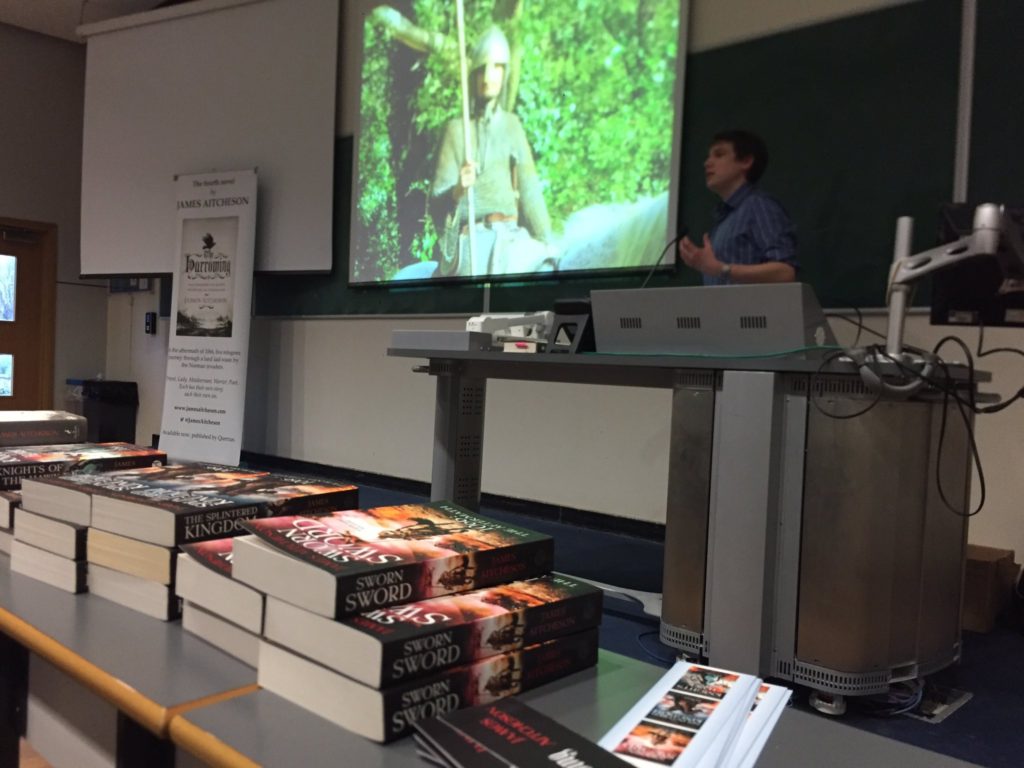
Delivering my public lecture on historical fact and fiction at Swansea University. Photo credit: Charlie Rozier.
The following week I was delighted to return to Huddersfield New College for the third year in a row as their guest author for World Book Day. As well as speaking about the process of researching and writing historical fiction with A-Level medieval and modern history students, I also led a creative workshop based around a series of timed writing challenges designed to free up the imagination and to help writers bypass the internal editor that can sometimes hold them back.
Students were encouraged to write as much or as little as they wanted, without any obligation to share what they’d produced. The challenges varied in difficulty and structuredness, including question-based prompts for generating plots, a picture-based free writing exercise and the ever-popular (and my favourite) “word salad”. I was hugely impressed not just with the energy and enthusiasm the students brought to all of the tasks, but also the range of different responses produced, which often put my own efforts in the shade!
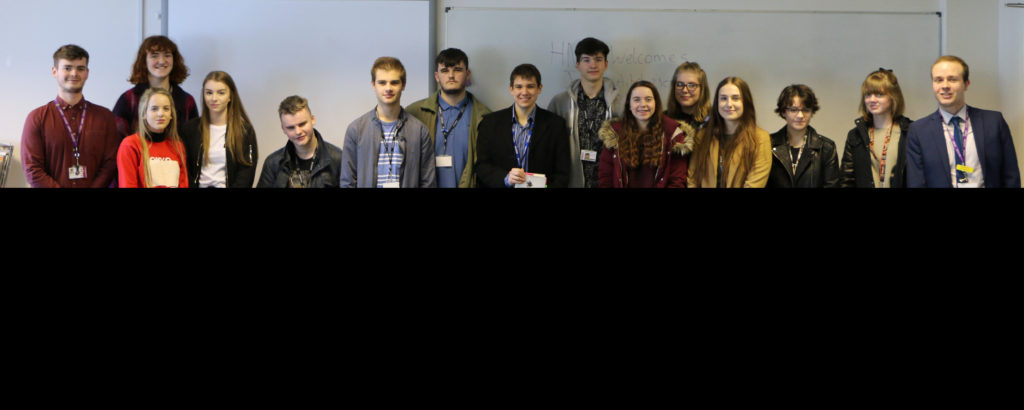
Me (centre, holding The Harrowing) with A-Level students at Huddersfield New College and History course leader Scott Townsend (far right). Photo credit: Huddersfield New College.
Again this year I was given the honour of presenting the certificates at a lunchtime prizegiving ceremony to the winners – chosen by College staff – of the annual short story competition, this year themed upon myths and legends. I also made myself available throughout the afternoon to chat with students about their current writing projects and give advice. It was fantastic to speak to so many keen young writers, and I wish them all the best for their future literary adventures. I’d like to thank Rebecca Hill, the College Librarian, for putting together this year’s event, as well as to Scott Townsend, Sarah Newton and the Principal, Angela Williams, for once more making me feel so welcome.
I’m always happy to visit schools, colleges and universities to speak about my work and to run creative writing sessions. If you’re a teacher, librarian or lecturer and would be interested in hosting a similar event, please do get in touch with me via the Contact page – I’d be glad to discuss some ideas.
Earlier this month I was thrilled to be invited back to Huddersfield New College in West Yorkshire for a second year in a row to give an event as part of their celebrations for World Book Day, which fell this year on Thursday 3 March.
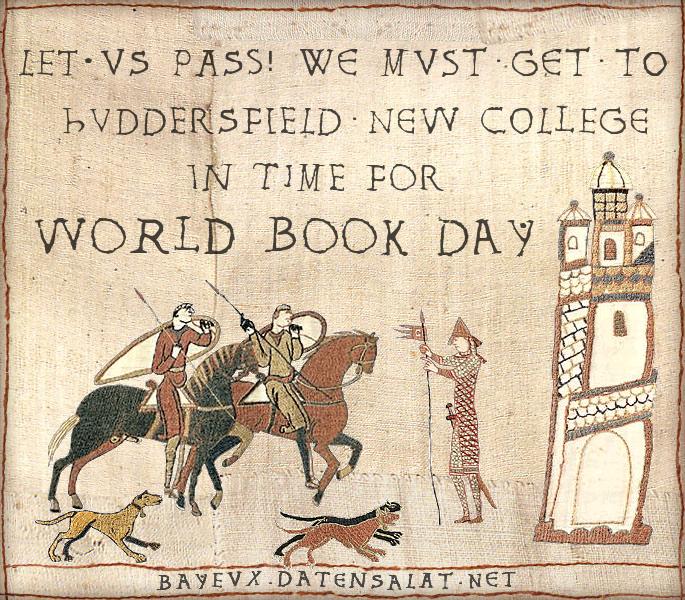
A previously undiscovered section of the Bayeux Tapestry.
As last year, I not only gave a talk to Year 12 and 13 History students about Anglo-Saxon England, but also ran a creative writing workshop for aspiring poets and prose writers, focussing on overcoming the fear of the blank page and on letting the imagination run wild.
The workshop involved a series of short exercises including a 3-minute free writing sprint, and various word- and picture-based challenges, after each of which we shared what we’d written with the rest of the group. It was a huge amount of fun not just for the students but also for me. As always in these sessions, I was massively impressed by the richness and diversity of the writing that emerged, and I hope that the students went away as energised and full of ideas as I did.
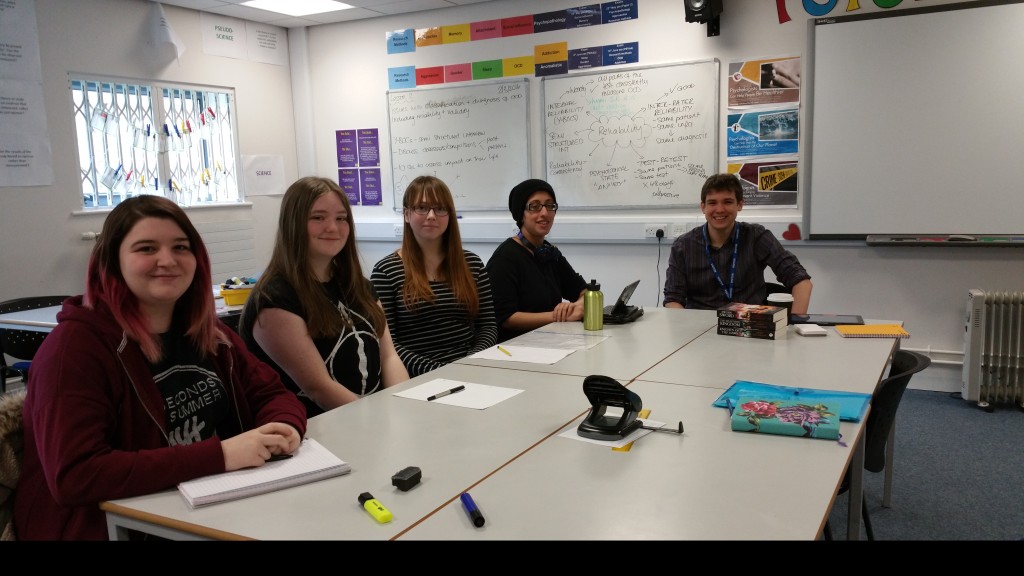
The writing workshop was a huge success, and tremendous fun too. Photo credit: Rebecca Wilson.
I was also given the honour of presenting the certificates at a lunchtime prizegiving ceremony to the winners – as chosen by staff – of the College’s annual short story competition. Needless to say it was a hectic day but also hugely enjoyable, and I’d like to thank the College librarian, Rebecca Wilson, for organising the event, as well as Mark Sheridan, Jean Westacott and the Principal, Angela Williams, for making me feel so welcome.
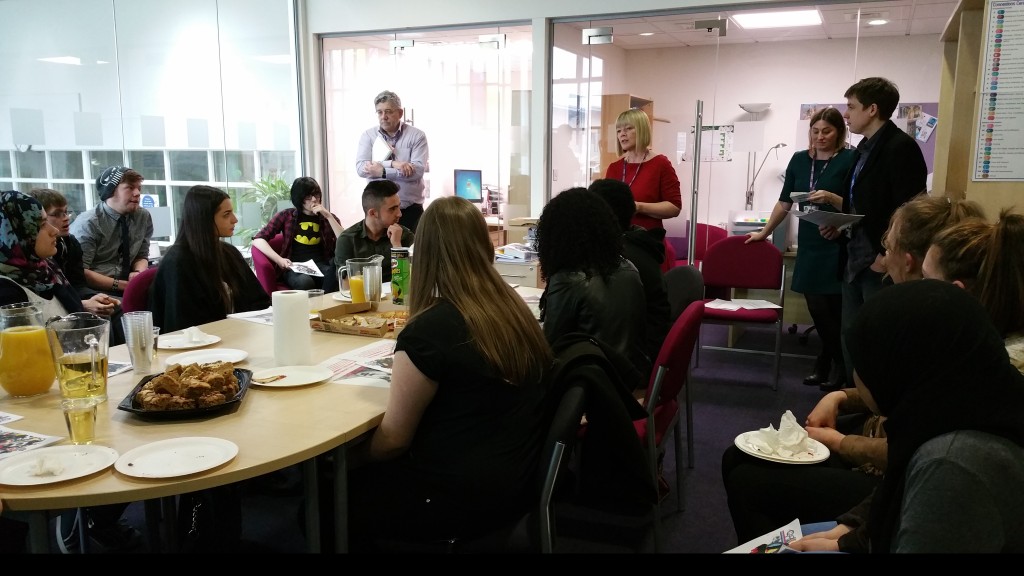
Presentation of the certificates for the winning entries in the student short story competition. Photo credit: Rebecca Wilson.
What makes a great first sentence? What do people look for in the opening of a novel? How do authors grab readers’ attentions and entice them to read on?
These were some of the questions I posed last week when I visited Marlborough College to lead a two-day creative writing workshop for a group of Year 9s as part of their summer term’s Form Festival. The ancient monuments at nearby Avebury provided the inspiration, the students provided the creativity, and the end result was the very smart-looking anthology pictured here!
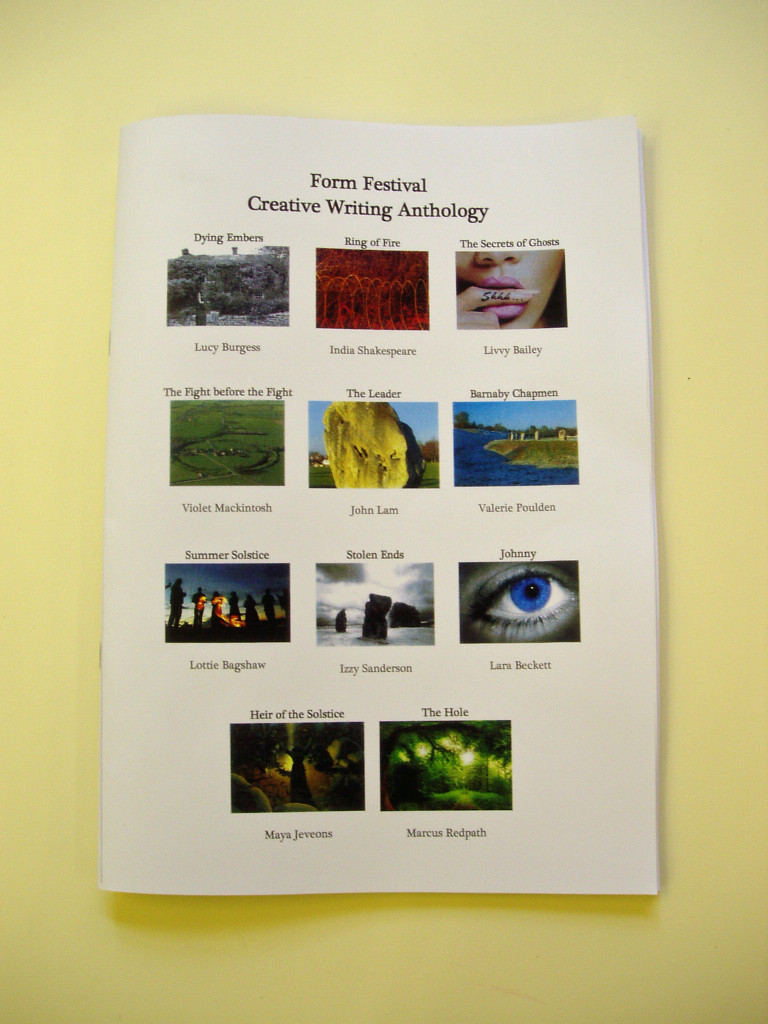
After spending a few hours exploring the ancient stones and the museums at Avebury, and trying to imagine the kinds of people who might have lived there through the ages, we returned to the College in the afternoon armed with character concepts and the seeds for possible plots.
With guidance, suggestions and feedback from me, the students then started to use the ideas they’d come up with to write a short story or the first chapter of a novel. At the end of the second day, all the pieces, complete with blurbs and front covers, were collected into the volume shown above, which was printed for the rest of the school to read and enjoy.
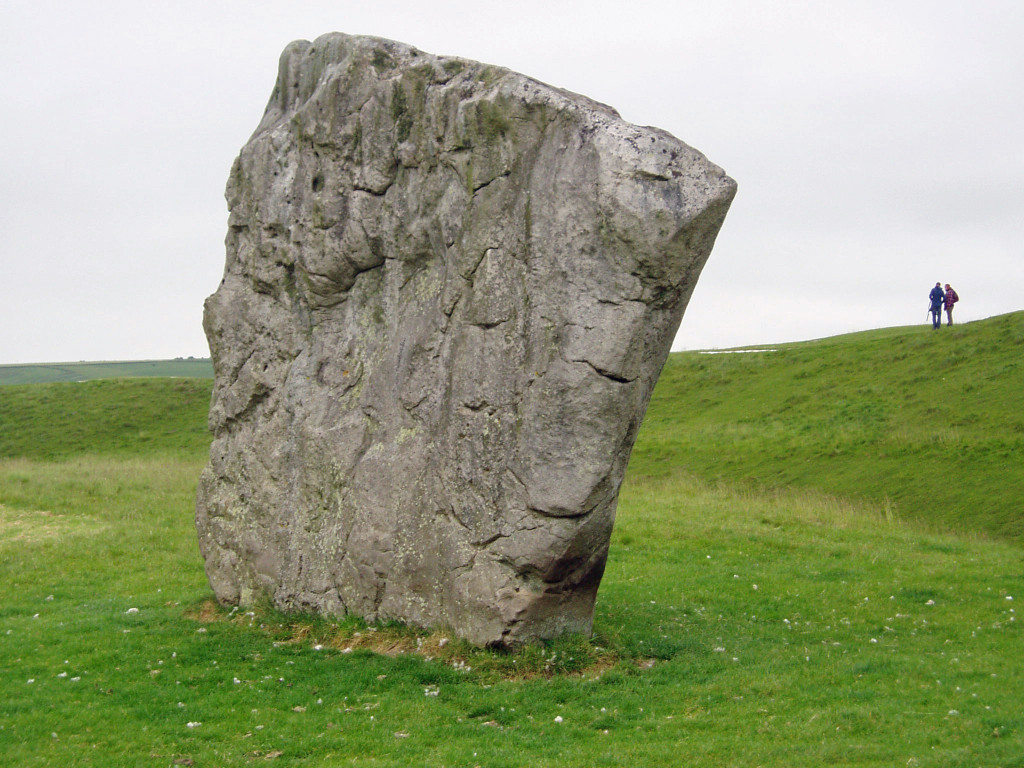
One of the two Portal Stones at Avebury, Wiltshire.
Although the main focus of the workshop was historical fiction, the students were encouraged to let their imaginations run wild and to write in whatever genre they liked, so long as their stories were connected in some way to Avebury.
What emerged from the workshop was an amazing outpouring of creativity. The tales produced took place in all periods of history, from the Neolithic to the Viking Age to the modern day; they featured supernatural forces, ancient rituals, long-forgotten battles, mysterious ruins, and a diverse range of characters including druids, archaeologists and a prehistoric proto-suffragette rebelling against the traditions of her tribe.
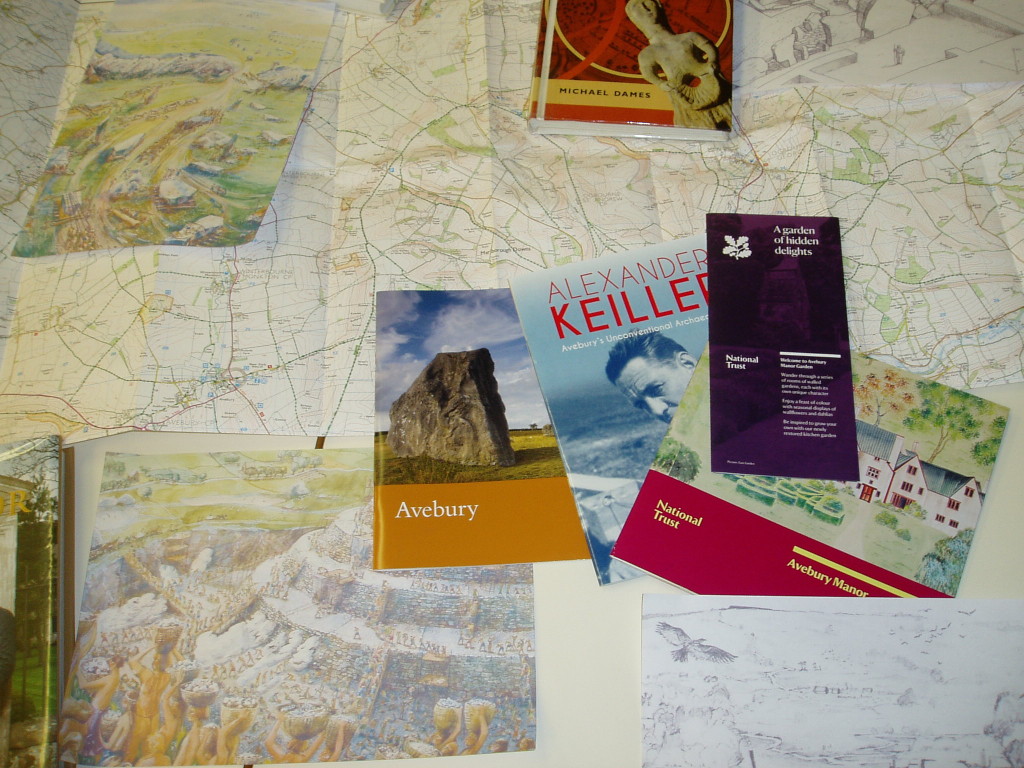
Some of the research materials used to generate ideas, including maps, artists’ renderings and (of course) books!
Thanks to everyone at Marlborough College for making me feel so welcome over the two days I was there. It was a pleasure to work with such an enthusiastic group of writers, and I wish them the best of luck for the future.
*
Earlier this year, I was invited to give a talk about the Norman Conquest and also to run a creative writing workshop at Huddersfield New College to celebrate this year’s World Book Day.
The creative writing session was based around a series of short, fun challenges designed to help free up the imagination, spark ideas and (above all) overcome the fear of the blank page – an affliction that strikes all authors from time to time.
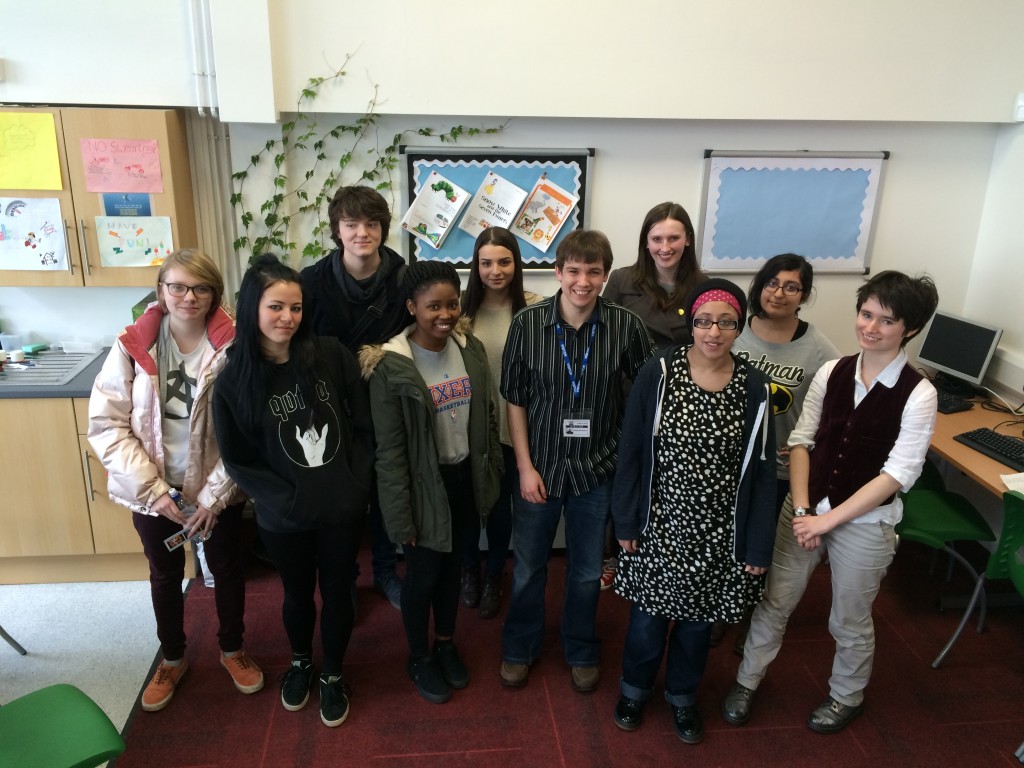
Here I am with the creative writing group at Huddersfield New College
on World Book Day 2015. Photo credit: Huddersfield New College.
I was blown away with the range and quality of writing produced in response to the various challenges I set. The workshop was enormous fun for me as well as for the students, as I think you can tell from our grins in the photo above, taken at the end of the workshop.
As at Marlborough, the welcome I received from both staff and students in Huddersfield was absolutely terrific. With any luck my being there will have inspired a few to go on to study History or to develop their writing further! I certainly felt very privileged to be in the presence of so many talented young authors, and I hope to be able to return in the not too distant future.
*
If you’d like to get in touch about organising a creative writing workshop at your school, college, library or festival, you can do so via the Contact page.



